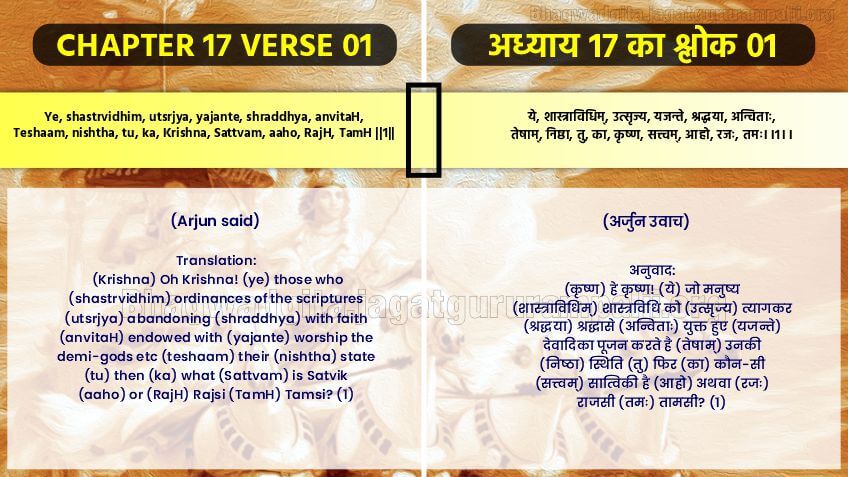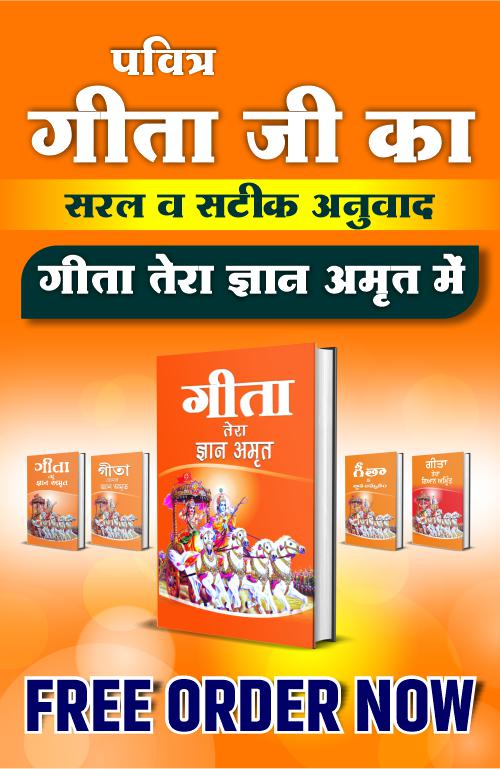
Important: - Arjun asked that, o Lord! What is the nature of those who do sadhna abandoning the ordinances of the scriptures i.e. who worship the three gunas (Rajgun-Brahma Ji, Satgun-Vishnu Ji, and Tamgun-Shiv Ji) and even those lower than these, ghosts-pitras, yagya, Bhairav etc?
(Arjun said)
Ye, shastrvidhim, utsrjya, yajante, shraddhya, anvitaH,
Teshaam, nishtha, tu, ka, Krishna, Sattvam, aaho, RajH, TamH ||1||
(Arjun uvaach)
Translation: (Krishna) O Krishna! (ye) those who (shastrvidhim) ordinances of the scriptures (utsrjya) abandoning (shraddhya) with faith (anvitaH) endowed with (yajante) worship the demi-gods etc (teshaam) their (nishtha) state (tu) then (ka) what (Sattvam) is Satvik (aaho) or (RajH) Rajsi (TamH) Tamsi? (1)
Translation
Oh Krishna! Those who, abandoning the ordinances of the scriptures, worship the demigods etc with faith, what is their state then, Satvik, Rajsi or Tamsi?
Important
In Adhyay 17 from Shlok 2 to 22, there is description of the religious practices performed by those devotees, who abandoning the ordinances of the scriptures, act arbitrarily i.e. worship according to their nature, which has been described as useless in Gita Adhyay 16 Shlok 23-24. For this reason only, Arjun has enquired in this Adhyay 17’s aforesaid Shlok 1. In its answer, God has said that whatever nature a devotee had in his previous human birth, he acquires the same nature whenever he attains a human birth again. He does not agree even when advised; know him to be of demoniac nature. The description of such worshippers is given with full explanation in Gita Adhyay 7 Shlok 12 to 15. Its evidence is clearly given in Gita Adhyay 8 Shlok 5-6. In this Adhyay 17 from Shlok 2 to 22, although there is description of the comparison between one-another; however, it is still opposite to the injunctions of the scriptures. Because of which, it is not meritorious. In this Adhyay 17 from Shlok 23 to the last Shlok 28, there is description of the attainment of the Purna Parmatma (Complete God) for which there is a special evidence in Gita Adhyay 4 Shlok 34 and Adhyay 15 Shlok 1 to 4.
विशेष:- अर्जुन ने पूछा कि हे भगवन! शास्त्रा विधि को त्याग कर साधना करने वालों अर्थात् तीनों गुणों (रजगुण ब्रह्मा जी, सतगुण विष्णु जी, तमगुण शिव जी) तथा इनसे भी नीचे भूत-पितर, यज्ञ, भैरव आदि की साधना करने वालों का स्वभाव कैसा होता है?
अध्याय 17 का श्लोक 1
(अर्जुन उवाच)
ये, शास्त्राविधिम्, उत्सृृज्य, यजन्ते, श्रद्धया, अन्विताः,
तेषाम्, निष्ठा, तु, का, कृष्ण, सत्त्वम्, आहो, रजः, तमः।।1।।
अनुवाद: (कृष्ण) हे कृृष्ण! (ये) जो मनुष्य (शास्त्राविधिम्) शास्त्राविधिको (उत्सृृज्य) त्यागकर (श्रद्धया) श्रद्धासे (अन्विताः) युक्त हुए (यजन्ते) देवादिका पूजन करते है (तेषाम्) उनकी (निष्ठा) स्थिति (तु) फिर (का) कौन-सी (सत्त्वम्) सात्विकी है (आहो) अथवा (रजः) राजसी (तमः) तामसी? (1)
केवल हिन्दी अनुवाद: हे कृष्ण! जो मनुष्य शास्त्राविधिको त्यागकर श्रद्धासे युक्त हुए देवादिका पूजन करते है उनकी स्थिति फिर कौन-सी सात्विकी है अथवा राजसी तामसी? (1)
विशेष:- अध्याय 17 श्लोक 2 से 22 तक उन शास्त्रा विधि त्याग कर मनमाना आचरण अर्थात् अपने-अपने स्वभाववश साधना करने वाले साधकों द्वारा किए जाने वाले धार्मिक पूजाओं का वर्णन है जिसको गीता अध्याय 16 श्लोक 23-24 में व्यर्थ कहा है। इसी लिए अर्जुन ने उपरोक्त इसी अध्याय 17 के श्लोक 1 में पूछा है, उसी का उत्तर देते हुए प्रभु ने कहा है कि जिस साधक का पिछले मनुष्य जीवन में जैसा स्वभाव था उसी का प्रभाव कभी फिर मनुष्य जन्म प्राप्त होता है वह उसी भाव में भावित रहता है। समझाने से भी नहीं मानता, उसे राक्षस स्वभाव के जान। ऐसे साधकों का विवरण गीता अध्याय 7 श्लोक 12 से 15 तक पूर्ण व्याख्या के साथ कहा है। इसी का प्रमाण गीता अध्याय 8 श्लोक 5-6 में स्पष्ट किया है। इस अध्याय 17 के श्लोक 2 से 22 तक भले ही एक-दूसरे की तुलना का विवरण कहा है फिर भी शास्त्रा विधि रहित ही है। जिस कारण श्रेयकर नहीं है। इस अध्याय 17 श्लोक 23 से अन्तिम 28 तक पूर्ण परमात्मा की प्राप्ति का विवरण है, जिसके लिए गीता अध्याय 4 श्लोक 34 व अध्याय 15 श्लोक 1 से 4 में विशेष प्रमाण है।
